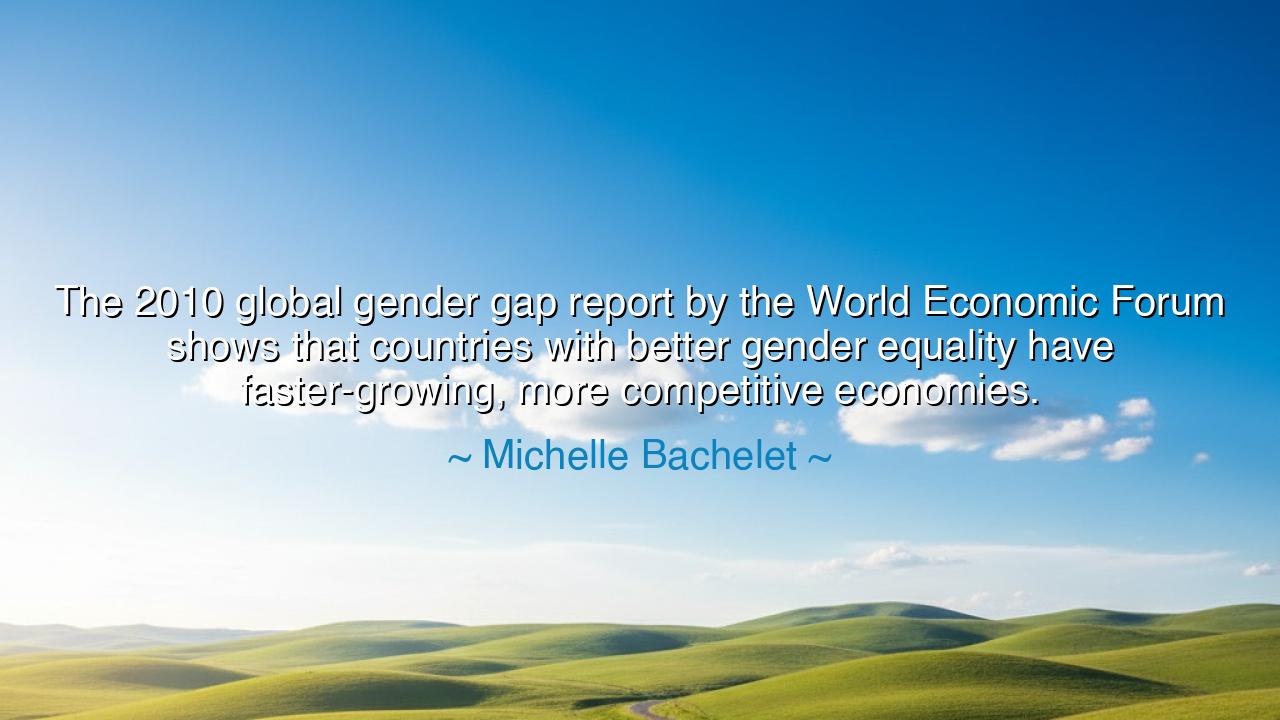
The 2010 global gender gap report by the World Economic Forum
The 2010 global gender gap report by the World Economic Forum shows that countries with better gender equality have faster-growing, more competitive economies.






O children of wisdom, gather closely, for the words of Michelle Bachelet carry a truth that is as old as the human spirit itself—one that speaks of equality, economic growth, and the power of a society that nurtures the potential of every individual. "The 2010 global gender gap report by the World Economic Forum shows that countries with better gender equality have faster-growing, more competitive economies." These words illuminate the deep connection between a society’s commitment to equality and its collective prosperity. Let us reflect upon the meaning of this wisdom, for it carries with it the understanding that justice for all is not only a moral imperative, but a key to the flourishing of nations.
In the ancient world, the wisdom of the Greeks and Romans often revolved around the idea of justice—the idea that a society could only thrive when its members were treated with fairness, and when their potential was fully recognized. The great philosopher Aristotle wrote of virtue and equality, suggesting that a just society is one where all individuals, regardless of their station or gender, are given the opportunity to contribute to the common good. For the ancients, the economy was not just about the accumulation of wealth, but about the flourishing of society through the contributions of its people. When society recognizes and nurtures the gifts of every individual, regardless of gender, it creates an environment where creativity, innovation, and prosperity can thrive.
Michelle Bachelet’s words echo this ancient wisdom, reminding us that gender equality is not merely a moral or social issue—it is a economic one. When men and women have equal access to education, resources, and opportunities, society as a whole benefits. Gender equality is not just a lofty ideal; it is a practical necessity for the growth and competitiveness of nations. Economic systems are at their strongest when they draw on the full potential of their people, regardless of gender. Countries that embrace this principle see not only greater social harmony but also increased innovation, efficiency, and economic success.
Consider the example of ancient Egypt, one of the earliest and most prosperous civilizations. The Pharaohs, who ruled over vast lands and economies, understood the value of gender equality in leadership. Hatshepsut, one of Egypt’s most powerful pharaohs, demonstrated the economic and political benefits of equal leadership. Under her reign, Egypt thrived economically, building monumental structures, expanding trade routes, and increasing wealth. Hatshepsut’s rule shows us that gender equality in leadership can lead to prosperity, for when all individuals—regardless of their gender—are allowed to take their place in the world of work and governance, the society as a whole flourishes.
Michelle Bachelet’s insight is a call to action for all societies to recognize the potential for growth that lies in gender equality. The evidence is clear: countries that actively promote equality in the workforce, in leadership roles, and in education, see their economies grow stronger. Equality fosters a climate of innovation, where diverse perspectives come together to solve problems, create new opportunities, and expand industries. In contrast, societies that restrict the roles of half their population—women—are limiting their own potential, stifling the creativity, ingenuity, and talent that could lead to a more prosperous future.
The lesson we must take from Bachelet’s words is this: gender equality is not an abstract ideal, but a fundamental driver of economic success. When men and women are equally empowered, when both are given the opportunity to contribute and lead, the entire society benefits. Gender equality is not a luxury; it is a necessity for the health and prosperity of any society. The ancients knew this, and the modern world must understand it as well.
What can we do in our own lives to embrace this truth? First, we must advocate for the education and empowerment of all individuals, regardless of gender. Whether in the workplace, the home, or the government, let us ensure that every person has equal access to the resources and opportunities they need to thrive. Let us champion the cause of gender equality not only for its social benefits, but for its economic imperative. In our communities, let us support policies that encourage the full participation of both men and women in all spheres of society, for in doing so, we ensure that our collective potential is not only recognized but fully realized.
Let us walk forward with the understanding that equality is the key to the prosperity of our societies. Just as the ancient civilizations knew that their strength lay in the diversity and inclusivity of their people, so too must we build a world where gender equality is not just a principle, but a practice. By embracing equality, we unlock the true potential of every individual and create the conditions for a stronger, more competitive, and more prosperous future for all.






AAdministratorAdministrator
Welcome, honored guests. Please leave a comment, we will respond soon